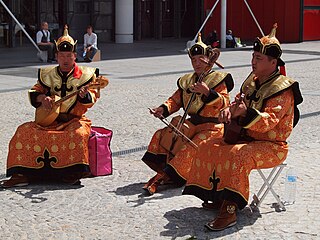
The Mongols are an East Asian ethnic group native to Mongolia, China, as well as Buryatia and Kalmykia republics of Russia. The Mongols are the principal member of the large family of Mongolic peoples. The Oirats and the Buryats are classified either as distinct ethno-linguistic groups or subgroups of Mongols.

Mongolia is a landlocked country in East Asia, bordered by Russia to the north and China to the south. It covers an area of 1,564,116 square kilometres, with a population of 3.5 million, making it the world's most sparsely populated sovereign state. Mongolia is the world's largest landlocked country that does not border a closed sea, and much of its area is covered by grassy steppe, with mountains to the north and west and the Gobi Desert to the south. Ulaanbaatar, the capital and largest city, is home to roughly half of the country's population.
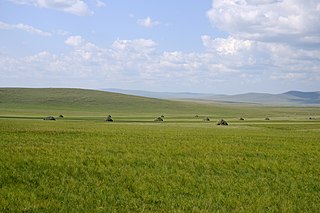
Inner Mongolia, officially the Inner Mongolia Autonomous Region, is an autonomous region of the People's Republic of China. Its border includes two-thirds of the length of China's border with the country of Mongolia. Inner Mongolia also accounts for a small section of China's border with Russia. Its capital is Hohhot; other major cities include Baotou, Chifeng, Tongliao, and Ordos.

Mongolian is the principal language of the Mongolic language family that originated in the Mongolian Plateau. It is spoken by ethnic Mongols and other closely related Mongolic peoples who are native to modern Mongolia and surrounding parts of East and North Asia. Mongolian is the official language of Mongolia and Inner Mongolia and a recognized language of Xinjiang and Qinghai.

Hohhot, formerly known as Kweisui, is the capital of Inner Mongolia in the north of the People's Republic of China, serving as the region's administrative, economic and cultural center. Its population was 3,446,100 inhabitants as of the 2020 census, of whom 2,944,889 lived in the metropolitan area consisting of 4 urban districts plus the Tümed Left Banner.
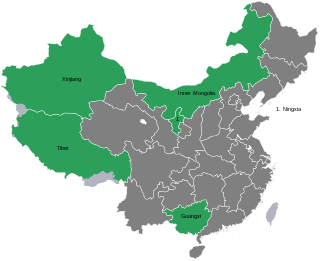
The autonomous regions are one of four types of province-level divisions of China. Like Chinese provinces, an autonomous region has its own local government, but under the law of the People's Republic of China, an autonomous region has more legislative rights, such as the right to "formulate self-government regulations and other separate regulations." An autonomous region is the highest level of minority autonomous entity in China, which has a comparably higher population of a particular minority ethnic group.

Mongolian wrestling, known as Bökh, is the folk wrestling style of Mongols in Mongolia, Inner Mongolia and other regions where touching the ground with anything other than a foot loses the match. Bökh means "firmness, reliability, vitality, wrestler", from Mongolic root *bekü "firm, hard, solid; fighter, strong man" Wrestling is the most important of the Mongolian culture's historic "Three Manly Skills", that also include horsemanship and archery. Genghis Khan considered wrestling to be an important way to keep his army in good physical shape and combat ready. The court of the Qing dynasty (1646–1911) held regular wrestling events, mainly between ethnic Manchu and Mongol wrestlers. There are several different versions, Mongolian, Buryatian, Oirat and Inner Mongolian.

Mongols in China, also known as Mongolian Chinese, are ethnic Mongols who live in China. They are one of the 56 ethnic groups recognized by the Chinese government.

Uyunqimg or Oyunchimeg/Oyunqemag was a Chinese politician of Mongol ethnicity. Between 2008 and 2013, she served as a vice chairperson of the Standing Committee of the 10th and 11th National People's Congress, the national legislature. Between 2000 and 2003 Uyunqimg served as Chairwoman of Inner Mongolia. She is the highest-ranked woman of ethnic minority background to have served in the Chinese government in the history of the People's Republic.

Pan-Mongolism is an irredentist idea that advocates cultural and political solidarity of Mongols. The proposed territory, called "Greater Mongolia" or "Whole Mongolia" usually includes the independent state of Mongolia, the Chinese region of Inner Mongolia, and the Russian region of Buryatia. Sometimes the autonomous republic Tuva, the Altai Republic and parts of Xinjiang, Zabaykalsky Krai, and Irkutsk Oblast are included as well. As of 2006, all areas in Greater Mongolia except Mongolia have non-Mongol majorities.
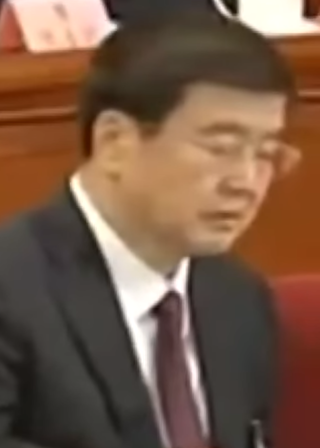
Bagatur or Bater is a Chinese Communist Party politician of Mongol ancestry, formerly serving as the Chairman of the National Ethnic Affairs Commission. A career party functionary with background in the Communist Youth League, Bagatur steadily ascended the ranks of government, spending his entire career in Inner Mongolia. Between 2009 and 2016, he served as Chairman of Inner Mongolia.

The Khatso people, commonly known as the "Mongols in Yunnan", is a Mongolic ethnic group, mainly distributed in Tonghai County in the Yunnan Province of southwestern China. The Khatso people are descendants of the army personnel of the Yuan dynasty.
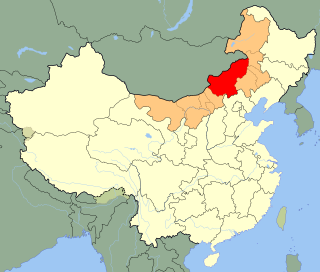
On the night of May 10, 2011 an ethnic Mongol herdsman was killed by a coal truck driver near Xilinhot, Inner Mongolia, China. The incident, alongside grievances over mining development in the region and the perceived erosion of traditional lifestyle of indigenous peoples, led to a series of Mongol protests across Inner Mongolia. Some 2000 students participated in protests at Communist Party headquarters of the West Ujimqin Banner, followed by demonstrations by secondary school students in the Xilinhot area. Select secondary schools and universities with large ethnic Mongol populations were reportedly under "lockdown". The Inner Mongolia government under Hu Chunhua tightened security in Inner Mongolian cities, including dispatching People's Armed Police troops to central Hohhot.
The Khoton or Qotung people are a Mongolic ethnic group in (Outer) Mongolia and Inner Mongolia. Most Mongolian Khotons live in Uvs Province in western Mongolia. In China, the Khotons live in Inner Mongolia, concentrated in Alxa League and are classified as ethnic Mongols. They speak the Dörbet or Alasha dialect of the Oirat language. According to the Great Russian Encyclopedia, modern Khoton people are a part of the "Mongols — a group of peoples who speak Mongolian languages".

Religion in Inner Mongolia is characterised by the diverse traditions of Mongolian-Tibetan Buddhism, Chinese Buddhism, the Chinese traditional religion including the traditional Chinese ancestral religion, Taoism, Confucianism and folk religious sects, and the Mongolian native religion. The region is inhabited by a majority of Han Chinese and a substantial minority of Southern Mongols, so that some religions follow ethnic lines.
Anti-Mongolianism, also called anti-Mongolian sentiment, has been prevalent throughout history, often perceiving the Mongols to be barbaric and uncivilized people with a lack of intelligence or civilized culture.

Wang Lixia is a Chinese politician of Mongol heritage, currently serving as deputy secretary of the Chinese Communist Party Inner Mongolia Committee and chairwoman of the Inner Mongolia Autonomous Region People's Government. In 2019, she was the only female party secretary of a provincial-level capital in China. Prior to that, she served as party secretary of Hohhot, the capital of the Inner Mongolia Autonomous Region, and director of the United Front Department of the CCP Inner Mongolia Committee from 2016 to 2019 and vice governor of Shaanxi from 2013 to 2016.

The Inner Mongolia incident, or the Inner Mongolia People's Revolutionary Party purge incident, was a massive political purge which occurred during the Cultural Revolution in Inner Mongolia. The purge was supported by the Central Committee of the Chinese Communist Party and was led by Teng Haiqing, a lieutenant general of the People's Liberation Army. It took place from 1967 to 1969 during which over a million people were categorized as members of the already-dissolved Inner Mongolian People's Revolutionary Party (PRP), while lynching and direct massacre resulted in the deaths of tens of thousands, most of whom were Mongols.

The 2020 Inner Mongolia protests was a protest caused by a curriculum reform imposed on ethnic schools by China's Inner Mongolia Department of Education. The two-part reform replaces Mongolian with Standard Mandarin as the medium of instruction in three particular subjects and replaces three regional textbooks, printed in Mongolian script, by the nationally-unified textbook series edited by the Ministry of Education, written in Standard Mandarin. On a broader scale, the opposition to the curriculum change reflects racism in China and the decline of regional language education in China.
Lili is a Chinese freestyle wrestler of Mongol ethnicity. She won a bronze medal in the 65kg event at the 2023 World Wrestling Championships held in Belgrade, Serbia.
















